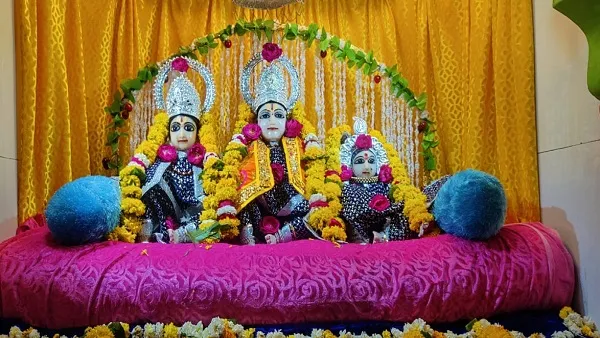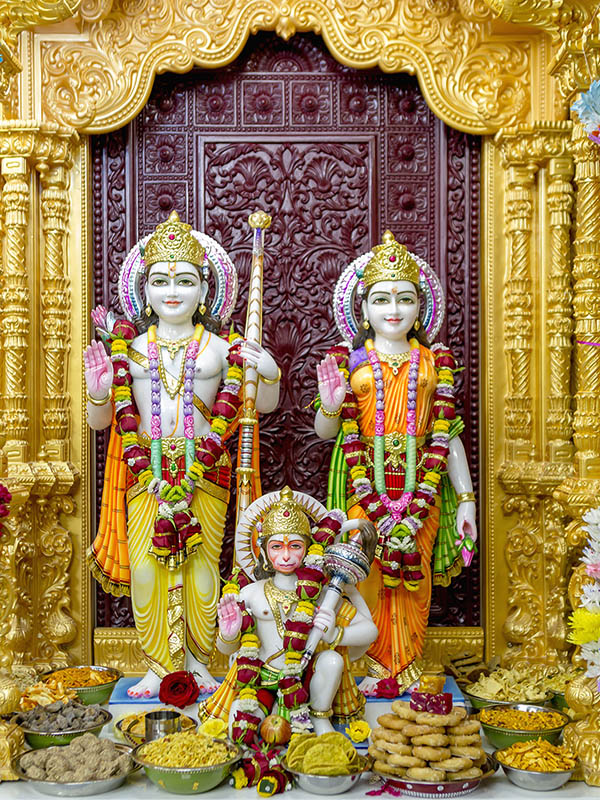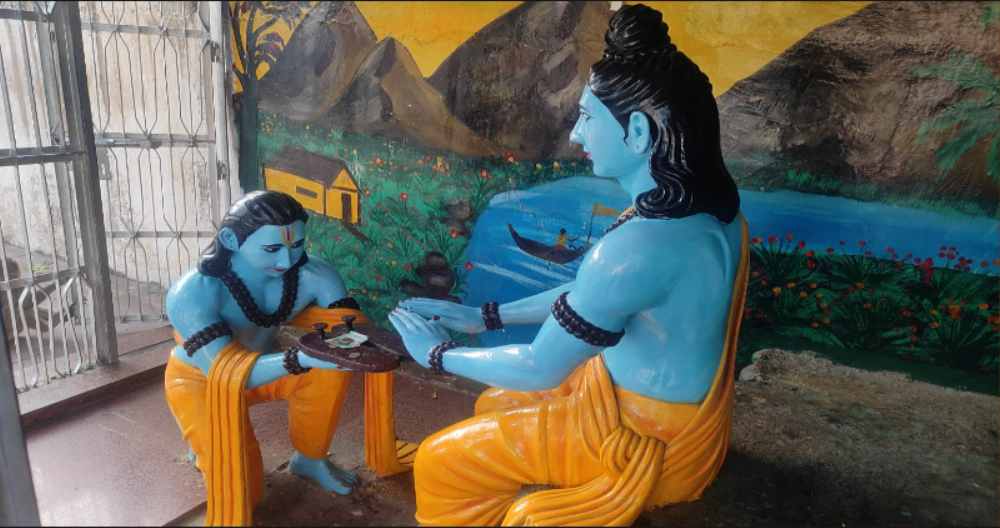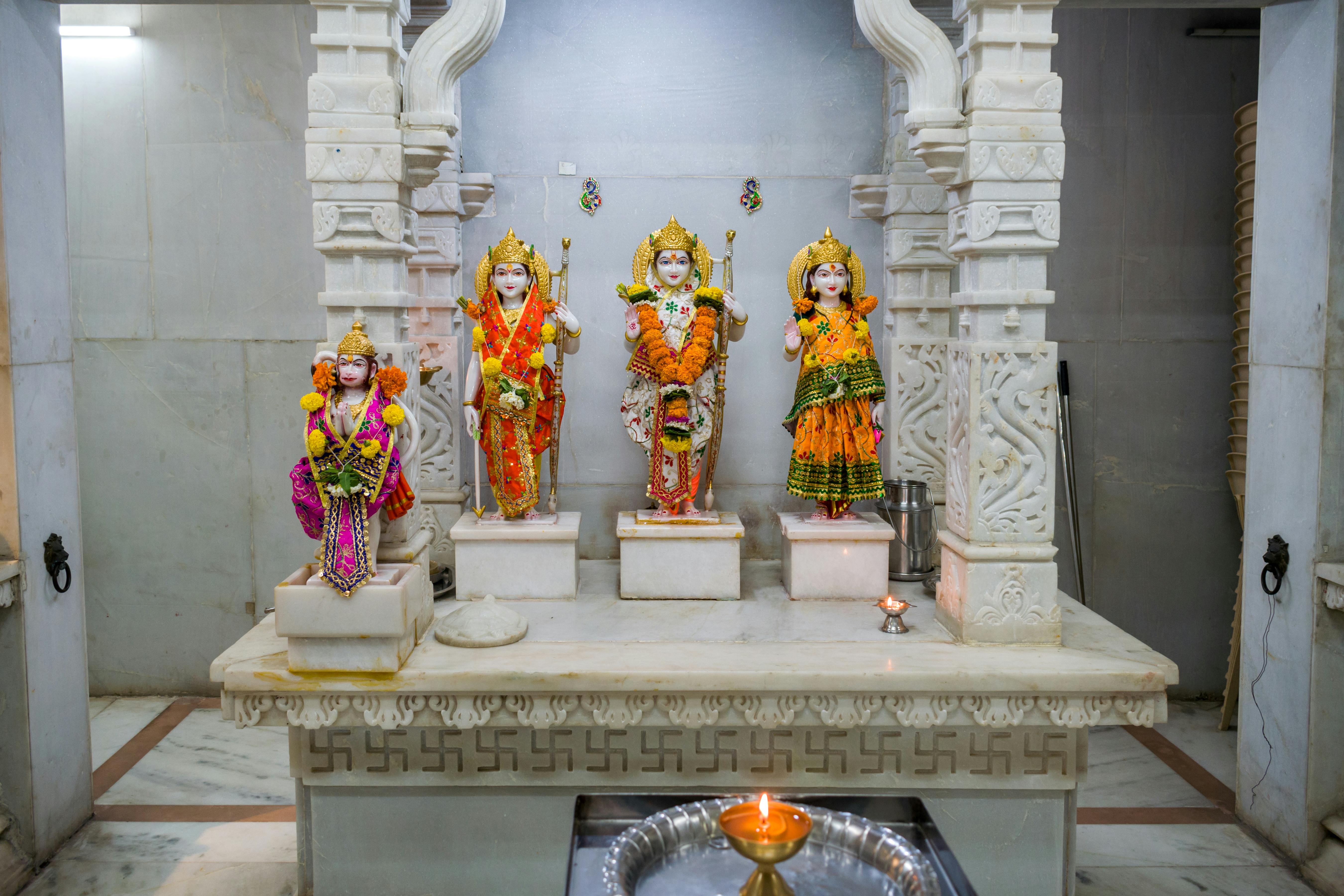The Path of Pure Devotion
Verse 1: The Call to Choose
जो मन भज्यो चहै हरि-सुरतरु।
तौ तज बिषय-बिकार, सार भज, अजहूँ जो मैं कहौं सोइ करु ॥ १ ॥
“O mind and heart, if you wish to benefit from the Kalpa Tree (the all-wish-fulfilling tree of the gods representing Lord Ram), then abandon all sensory corruption and worldly delusions. Instead, worship and have devotion to the holy name of Lord Shri Ram, which is the basis and essence of all that is auspicious and blessed. Do what I advise you, even now, at this late stage. Nothing is lost yet, and redemption can still be yours.”
The Metaphor of the Kalpa Tree
The Kalpa Tree is not an ordinary tree. It is divine. It stands in the realm of the gods and grants every wish. Whatever you ask of it, it gives. There is no limitation, no scarcity, no refusal.
But here is the teaching: this divine tree is not separate from you. The Kalpa Tree is Ramji. Lord Ram is the ultimate fulfiller of all desires, the answer to all longings, the provider of all blessings.
The Choice Before You
Tulsidas presents a stark choice:
On one side is “Bisaya-Bikara,” the corruption of sensory objects and worldly delusions. This is what normally occupies your mind and heart. The endless pursuit of pleasure, security, status, and stimulation. The constant running after what excites the senses and away from what disturbs them.
On the other side is “Sara Bhaja,” devotion to the sacred essence, to the holy name.
These are not compatible paths. You cannot simultaneously be chasing worldly delusions and seeking divine grace. Your heart is too small for both. You must choose.
The Urgency and Compassion
Notice Tulsidas’s tone. He says, “even at this late stage.” This implies:
- You have wasted time already
- Your life is passing
- You may not have many more chances
- But it is still not too late
This is not meant to frighten but to awaken. It is the compassion of someone who sees you clearly and wants you to see yourself. He is saying: “Look, I am not here to flatter you or make you comfortable. I am here to tell you the truth. You have time, but not unlimited time. Use it wisely.”
Verse 2: The Four Virtues and Six Enemies
सम, संतोष, बिचार बिमल अति, सतसंगति, यर चारि दृढ़ करि धरु।
काम-क्रोध अरु लोभ-मोह-मद, राग-द्वेष निसेष करि परिहरु ॥ २ ॥
“You must diligently practice four virtues: (1) Samata (Evenness and equitability), (2) Santosh (contentedness), (3) Vimal Mati (purity of mind and discrimination), and (4) Satsang (communion with holy saints). Furthermore, you must completely abandon six negativities: (1) Kama (lust), (2) Krodha (anger), (3) Lobha (greed), (4) Moha (delusion), (5) Mada (pride), and (6) Raag-Dwesh (attachment and aversion).”
The Four Virtues That Must Be Firmly Established
1. Samata (Equanimity)
Equanimity means seeing all situations with equal vision. When good things happen, you do not inflate with pride. When bad things happen, you do not collapse into despair. You see through the changing surface to the unchanging reality beneath.
This is not indifference or passivity. It is wisdom that sees beyond the opposites of success and failure, gain and loss, pleasure and pain.
2. Santosh (Contentedness)
Contentedness means being satisfied with what you have, without constantly yearning for more. This directly addresses the restlessness that dominates modern life.
Notice: contentedness does not mean laziness or lack of effort. It means that your happiness is not dependent on acquiring more. You can work and strive, but you are not enslaved by the need for accumulation.
The power of this virtue is enormous. When you are content, you are free from anxiety, envy, and desperation. You can think clearly and act wisely because you are not operating from a place of lack.
3. Vimal Mati (Purity of Mind and Discrimination)
Purity of mind means your thoughts are not corrupted by selfishness, deception, or confusion. Your intellect is clear and can discern right from wrong.
This is not purity in a moralistic sense, but clarity. A pure mirror reflects accurately. A tarnished mirror distorts the image. Your mind must become a pure mirror that reflects reality as it is, not as your desires wish it to be.
4. Satsang (Communion with Holy Saints)
This virtue deserves special attention. Tulsidas emphasizes that you must seek the company of pious and holy souls. You must attend communities and gatherings where spiritual truths are discussed and sacred stories are shared.
Why does he emphasize this so much? Because you cannot transform alone. Your consciousness is shaped by your environment. If you surround yourself with people obsessed with money, status, and sensory pleasure, you will become like them. But if you sit with those who love truth and seek the Divine, their frequency gradually becomes your frequency.
The Six Enemies That Must Be Completely Abandoned
These are not to be managed or controlled. They are to be completely abandoned. Not even a trace should remain.
1. Kama (Lust and Sensory Craving)
Lust is the constant reaching for sensory pleasure. It is the mind’s addiction to excitement and stimulation. When you abandon Kama, you do not become dead or mechanical. You become free. You can enjoy life without being enslaved by the need for pleasure.
2. Krodha (Anger)
Anger is the explosion that destroys. It destroys relationships, reputations, and inner peace. Tulsidas says you must not even entertain a trace of it. Why? Because even small angers, when indulged, grow into forests of rage.
3. Lobha (Greed)
Greed is the insatiable hunger. No matter how much you have, it whispers “I need more.” When you abandon greed, you step off the hamster wheel. You can pursue goals without being driven by desperate hunger.
4. Moha (Delusion)
Moha is the fundamental misunderstanding that temporary things are permanent, that changing things are unchanging. It is the root of all suffering because it makes you cling to what cannot be held.
5. Mada (Pride)
Pride is the swelling of ego. It disguises itself as confidence or self-respect, but it is actually a contraction of the heart. When pride is abandoned, there is room for grace to enter.
6. Raag-Dwesh (Attachment and Aversion)
These two always come together. You attach to what you like and avert from what you dislike. This creates a fragmented consciousness that cannot know peace or unity.
When both are abandoned, you see the underlying oneness in all things.
The Difficult Truth
Tulsidas ji demands complete abandonment of these six. He does not say “reduce” or “control” or “manage.” He says you must not have even a trace of them.
This seems impossibly difficult. And it is, if you rely only on willpower. But here is the secret: as you practice the four virtues, the six enemies naturally weaken and fall away. They are not defeated through direct combat, but through being starved of the consciousness they feed on.
Verse 3: The Six Practices and Divine Vision
श्रवन कथा, मुख नाम, हृदय हरि, सिर प्रनाम, सेवा कर अनुसरु।
नयननि निरखि कृपा-समुद्र हरि, अग-जग-रूप भूप सीताबरु ॥ ३ ॥
“Listen with your ears to the glorious deeds of Lord Ram. Speak with your mouth His holy name with faith and devotion. Meditate in your heart on His divine form. Bow your head reverentially before Him. Serve Him with your hands. And with your eyes, behold the divine form of Lord Hari, the ocean of mercy, the embodiment of the entire universe, both visible and invisible, the Supreme Lord of all lords, the beloved of Sita ji.”
The Practice of Divine Vision
This is perhaps the most profound teaching. You must develop the capacity to see Lord Ram in all things.
Not just in temples or in holy images. You must see Ram in the log of wood, in the beauty of nature, in the invisible elements of sky, fire, air, and water. Most importantly, you must see Ram in your enemies, in those who harm you, in all beings without exception.
This is not imagination or positive thinking. This is the development of genuine spiritual sight. The Lord is already present everywhere. You are simply learning to see what is objectively true.
The Six Practices Integrated
The six practices work together:
- Your ears listen to sacred stories that inspire transformation
- Your mouth speaks the holy name that vibrates your consciousness
- Your heart meditates on the Divine form that becomes your constant companion
- Your head bows in surrender that breaks the ego
- Your hands serve others selflessly that purifies the heart
- Your eyes develop the vision to see the Divine in all beings
When all six are practiced together, your entire being becomes an instrument of transformation.
The Vedantic Vision
Tulsidas ji references the Vedantic teaching that the Divine is not limited to any specific form. The Lord is not only “the son of Dasharatha” (Shri Ram’s earthly form) nor is He only the abstract “Neti-Neti” (neither this nor that).
He is both and transcends both. He is in the smallest atom and the vastest galaxy. He is in the visible forms and the invisible elements. He is in holiness and apparent impurity, in friends and enemies, in light and darkness.
This is the non-dual vision that liberates.
Verse 4: The Promise and the Final Cry
इहै भगति, बैराग्य-ग्यान यह, हरि-तोषन यह सुभ ब्रत आचरु।
तुलसिदास सिव-मत मारग यहि, चलत सदा सपनेहुँ नाहिंन डरु ॥ ४ ॥
“This is the essence of devotion, renunciation, knowledge, and the way to please the Lord. Follow this auspicious path and be steadfast in this vow. This is the path taught by Lord Shiva himself. By walking on this path, one shall not have any fear in this world, even in dreams.”
The Ultimate Promise
When you practice these teachings sincerely, you become free from fear. Not just minor fears, but all fear. Even in dreams, you will not be troubled.
Why? Because fear arises when you believe you are separate from the Divine. When you have touched the reality of Divine presence in all beings and all situations, when you have surrendered your ego and your need for control, when you have seen that the Lord is caring for you always, what is left to fear?
All worldly fears, of death, disease, loss, judgment, abandonment, lose their grip. You have tasted something eternal, and the temporal can no longer terrorize you.
The Acknowledgment of Authority
Tulsidas ji emphasizes that this teaching comes from Lord Shiva, the supreme yogi and highest wisdom. This gives the path credibility. It is not a personal philosophy or a new invention. It is an eternal truth, verified and taught by the highest authorities.
Closing Reflection
These four verses form a complete path:
- Choose what you truly want
- Cultivate the virtues and abandon the enemies
- Practice the six disciplines that transform your entire being
- Surrender completely into the hands of grace and seek only the company of the sincere
This is not a path of great effort and striving. It is a path of surrender and trust, guided by love.
The Kalpa Tree stands before you. It is not somewhere distant in the gods’ realm. It is here, now, in the form of the Lord’s grace that is always available.
“When the mind turns toward the Divine with sincere heart, all the wishes of that sincere heart are fulfilled, not because the Divine is obliged to fulfill them, but because in seeking the Divine, all other desires naturally fall away, and what remains is already granted.”







